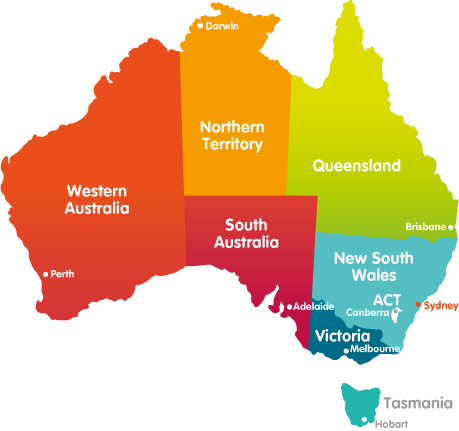Everything you need to know about buying a property interstate
If you’re thinking about diversifying your property portfolio or are looking for a market where there is a good investment opportunity, you’ll want to think about becoming a borderless investor.
But the trick is how do you avoid the hidden mistakes while ensuring you don’t miss out on any golden opportunities of buying property interstate.
When should I consider buying property interstate?
When you’re thinking about investing in property, there are three key things to consider.
- Your budget – and that will be determined by the banks
- Location – you can’t compromise on this
- The right property in that location
Many investors make the classic mistake of focusing on investing in their own backyard because they feel like they can get better results if they invest somewhere they’re familiar with.
They then tend to let their emotions get in the way, but unfortunately, emotional investing rarely makes good financial sense.
 Just because you might have lived in an area for years, or even your whole life, that doesn’t necessarily make it a good idea to invest in that location.
Just because you might have lived in an area for years, or even your whole life, that doesn’t necessarily make it a good idea to invest in that location.
Especially if you’re not in one of our 3 big capital cities – Sydney, Brisbane, or Melbourne – where capital growth is likely to be higher over the long term.
But even if you do live in one of our big capitals, it may still be worth looking interstate as rising property prices are forcing more investors out of investment-grade locations in Melbourne and Sydney.
To be clear…what I’m recommending is that as investors build their property portfolios, they should not fight the big economic and demographic trends and should only add investment-grade properties in the 3 big capital cities in Australia to their assets.
The pros & cons of buying property interstate
The pros:
There are a number of clear benefits of becoming a borderless investor.
- Investing in a city other than your own can be a smart way to diversify and spread your risk across multiple markets.
- It also allows you to take advantage of growth cycles that may be stronger than your local area.
- And investing interstate may lower your land tax bill as each state has its own land tax threshold.
Over the years, I’ve come across a large number of investors who strictly buy in their own state (or worse still, their own city or back yard) because it’s in their comfort zone.
It just makes sense to them and they can easily visit the property and see it with their own two eyes.
They make this huge investment decision based on their proximity to the property, rather than on evidence, facts, or research.
They get it wrong because they think searching for properties (in their backyard) is researching – they are very different things, so they tend to buy underperforming properties.
What investors really need to do is look for the right property, in the right location, at the right price, and interstate investing hugely opens up those opportunities – it just makes sense to take advantage of good investment opportunities that you’re able to identify locally.
The cons:
Of course, investing interstate doesn’t come without risk.
You see, Australia is made up of many different real estate markets, each with its own cycle and which don’t always move in sync, so you have to have a good idea of what’s happening in the market you’re considering.
You just have to look at the significant variance of growth in the different property markets in 2021 to see what I mean.
In the last quarter alone, Domain House Price Report for the March 2021 quarter reveals that house prices in some cities have surged by 8-9% so far this year, while others have enjoyed a much more lackluster sub-2% growth.
 And it’s the same story for units – prices in some cities have jumped as much as 3.9% while in other areas prices have actually declined.
And it’s the same story for units – prices in some cities have jumped as much as 3.9% while in other areas prices have actually declined.
And the divergence between markets doesn’t stop there either – even within each city, some suburbs or even streets will even see a disparity between market values.
By that I mean, one suburb can be experiencing growth, while a nearby suburb may not.
Why?
There are so many reasons for this, including the individual characteristics of the neighbourhood.
An oversupply of apartments, for instance, can make one suburb perform poorly, while a few suburbs over, closer to the city and with fewer apartments, the market is growing.
Interstate suburbs also carry extra risk in that they need more research because you can’t assume that what determines property prices in your area will apply to other areas elsewhere.
You’ll need to do your due diligence and additional research if you’re going to invest interstate in areas you don’t know as well as your own backyard.
Two main things to consider when buying property interstate
As far as I’m concerned, there are two main things to consider when becoming a borderless property investor, and they’ll be the make or break of your investment.
1. Have a long-term strategy
Any investment you make should be part of a long-term strategy rather than an isolated event.
That’s because property investment is a process, not a one-off event, so any investment, no matter where its location, needs to strategically fit in with your long-term goals.
2. Get a buyer’s agent to represent you
A local buyer’s agent with great perspective and experience in the area which you’re planning to buy is invaluable and as far as I’m concerned, vital for a successful investment.
Trying to invest interstate either without a buyer’s agent or with one who doesn’t really understand the nuances of the local markets could be a recipe for disaster.
 Steer clear of buyer’s agents that fly in and fly out. They just don’t have the on-the-ground perspective that’s needed to make a smart decision.
Steer clear of buyer’s agents that fly in and fly out. They just don’t have the on-the-ground perspective that’s needed to make a smart decision.
As Australia’s most trusted buyers’ agents involved in over $4 billion worth of transactions creating wealth for our clients, we at Metropole can certainly help.
Our on the ground teams in Melbourne, Sydney, and Brisbane bring you years of experience and perspective – that’s something money just can’t buy.
How important is it to visit the property?
Many investors are hesitant about buying property interstate because they’re uncertain about buying a property without both seeing it first, and also being able to revisit when they like.
Sure, you should never buy a property without seeing it first, but that doesn’t mean it needs to be you, the investor, who personally does that.
 This is another task that could and should be passed onto your local and experienced buyer’s agent.
This is another task that could and should be passed onto your local and experienced buyer’s agent.
Your buyer’s agent is representing you, should understand exactly what you’re after, and also know the local markets well enough to know what to look out for, so why not let them do the leg work for you?
So long as you’ve done adequate research and checks on the property and a representative has personally visited, there is no reason for you to take the trip interstate to do the same.
Top tips to help you buy property interstate
The principles of buying interstate residential property are much the same as buying locally although there are additional matters to consider.
Here are my top nine tips and hints to help you buy outside your own state.
- Invest with your head, not your heart
- Have a long-term investment strategy
- Only look at properties in investment-grade locations that outperform the averages with regards to capital growth over the long term.
- Look for the right property, at the right price, and in the right location
- Do your research and due diligence on the area (historical prices, rental yields, development plans, and particularly employment opportunities, population growth, and infrastructure development).
- Hire a local buyer’s agent with comprehensive local market knowledge and experience
- Don’t be afraid to buy sight unseen as long as your buyer’s agent has provided you with plenty of photos, videos, and due diligence material
- Don’t rush – time in the market is more important than getting the timing right.
- Make sure you do the math – from stamp duty to land tax structures (these will differ in each state) and any other cost of ownership, it’s important to be on top of the numbers.
Originally published by Property Update
By Michael Yardney




